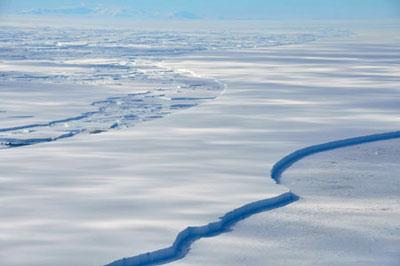Source: Xinhua
04-06-2009 13:59
Special Report: Tech MaxWELLINGTON, April 6 (Xinhua) -- An ice shelf that is wrenching itself away from Antarctica is a symptom of global warming and will have further environmental consequences, according to a New Zealand scientist.
 |
| The Wilkins Ice Shelf off the Antarctic Peninsula is seen breaking up January 18, 2009. The huge Antarctic ice shelf is on the brink of collapse with just a sliver of ice holding it in place, the latest victim of global warming that is altering maps of the frozen continent. (Xinhua/Reuters Photo) |
A satellite picture showed that a 40-km-long strip of ice believed to pin the Wilkins Ice Shelf in place has snapped at its narrowest point, off the Antarctic Peninsula.
Professor Tim Naish from the Antarctic Research Center at Victoria University in Wellington said it was the ice sheets behind the ice shelf that concern him and other scientists, Radio New Zealand reported on Monday.
The ice bridge had held a vast Antarctic ice shelf in place for hundreds of years.
Naish said the shelf measures about 14,000 square km and as the ice shelves melt, the ice sheets start sliding faster into the ocean.
Researchers regarded the ice bridge as an important barrier to holding the remnant shelf structure in place.
Scientists said the collapse provides further evidence or rapid change in the region.
The loss of the ice bridge, which was almost 100 km wide in 1950, could allow ocean currents to wash away more of the shelf.
Temperatures on the Antarctic Peninsula have risen by up to about 3 degrees Celsius in the past 50 years, the fastest rate of warming in the Southern Hemisphere.
Nine other shelves have receded or collapsed around the Antarctic Peninsula in the past 50 years.
Editor:Zheng Limin
